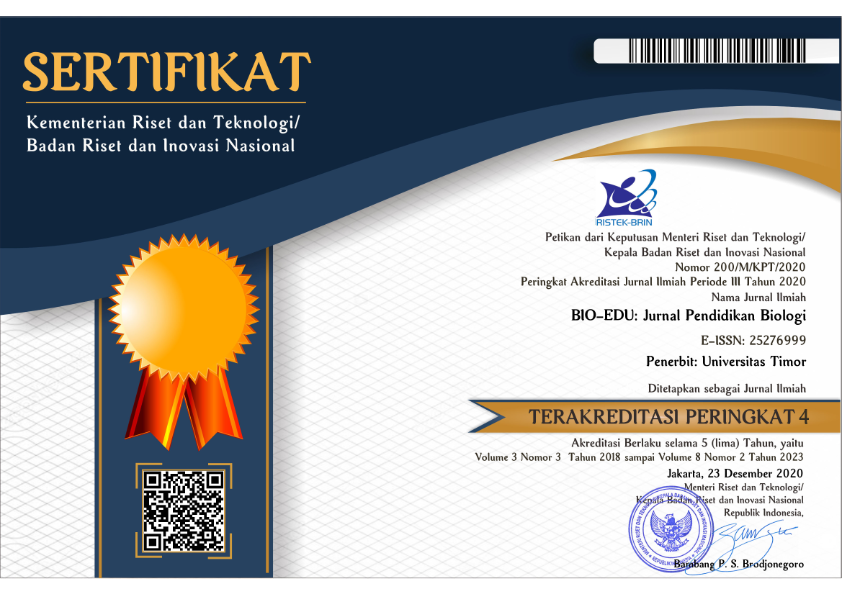PROFIL TINGKAT PENERIMAAN TERHADAP TEORI EVOLUSI PADA SISWA SMA DAN MA
DOI:
https://doi.org/10.32938/jbe.v6i3.1066Keywords:
Teori evolusi, Penerimaan evolusiAbstract
Studi ini dilakukan untuk mengidentifikasi tingkat penerimaan teori evolusi siswa SMA dan MA. Studi ini juga melakukan analisis untuk melihat apakah terdapat perbedaan tingkat penerimaan teori evolusi antara siswa SMA dan MA. Tingkat penerimaan teori evolusi diukur dengan menggunakan instrumen MATE (Measure of Acceptance of the Theory of Evolution) yang sudah dimodifikasi dan diterjemahkan. Subyek studi ini ialah 28 orang siswa kelas 12 SMA serta 33 orang siswa kelas 12 MA. Data yang didapatkan lalu dianalisis secara statistik sehingga menggambarkan profil tingkat penerimaan siswa SMA dan MA terhadap teori evolusi. 10 siswa (35, 71%) SMA memiliki penerimaan rendah, 15 siswa (53, 58%) SMA memiliki penerimaan sedang, serta 3 siswa (10, 71%) SMA memiliki penerimaan rendah. Sedangkan untuk siswa MA profil tingkat penerimaan terhadap teori evolusi adalah sebagai berikut, 1 orang siswa (3,03%) memiliki penerimaan sangat rendah, 9 siswa (27, 27%) memiliki penerimaan rendah, 22 siswa (66, 67%) memiliki penerimaan sedang, serta 2 siswa (6, 06%) memiliki penerimaan tinggi. Hasil uji Mann Whitney-U menunjukkan tidak ada perbedaan yang signifikan antara tingkat penerimaan teori evolusi siswa SMA dan MA.
References
De Baz, T., & El-Weher, M. (2012). The effect of contextual material on evolution in the Jordanian secondary-school curriculum on students’ acceptance of the theory of evolution. Journal of Biological Education, 46(1), 20–28.
Dobzhansky, T. (1973). Nothing in biology makes sense except in the light of evolution. The American Biology Teacher, 35(3), 125–129.
Ghozali, I. (2002). Aplikasi Analisis Multivariat dengan Program SPSS. Semarang: Badan Penerbit Universitas Diponogoro.
Ha, M., Haury, D. L., & Nehm, R. H. (2012). Feeling of certainty: Uncovering a missing link between knowledge and acceptance of evolution. Journal of Research in Science Teaching, 49(1), 95–121.
Krech, D., Crutchfield, R.S., & Ballachey, E.L. (1982). Individual in Society. Chapter 7: The Changing of Attitudes. Berkeley: McGraw-Hill International Book Company.
Rutledge, M. L., & Sadler, K. C. (2007). Reliability of the Measure of Acceptance of the Theory of Evolution (MATE) instrument with university students. American Biology Teacher, 69(6), 332–335.
Rutledge, M. L., & Warden, M. A. (1999). The Development and Validation of the Measure of Acceptance of the Theory of Evolution Instrument. School Science and Mathematics, 99(1), 13–18.
Sinatra, G. M., Southerland, S. A., McConaughy, F., & Demastes, J. W. (2003). Intentions and beliefs in students’ understanding and acceptance of biological evolution. Journal of Research in Science Teaching, 40(5), 510–528.
Sudjana. (2005). Metode Statistika. Bandung: Tarsito.
Sugiyono. (2014). Metode Penelitian Kuantitatif Kualitatif dan R&D. Bandung: Alfabeta CV.
Supani. (2009). Sejarah Perkembangan Madrasah di Indonesia. INSANIA: Jurnal Pemikiran Alternatif Kependidikan, 14(3), 560-579.
Trani, R. (2004). I wont’t teach evolution: It’s against my religion. And now for the rest of the story. American Biology Teacher, 66(6), 419–427.
Wiles, J. R., & Alters, B. (2011). Effects of an Educational Experience Incorporating an Inventory of Factors Potentially Influencing Student Acceptance of Biological Evolution. International Journal of Science Education, 33(18), 2559–2585.
Woods, C. S., & Scharmann, L. C. (2001). High school students’ perceptions of evolutionary theory. Electronic Journal of Science Education, 6(2). Retrieved from: https://www.researchgate.net/publication/339509124_High_School_Students'_Perceptions_of_Evolutionary_Theory
Downloads
Published
Issue
Section
License
The Authors submitting a manuscript do so on the understanding that if accepted for publication, the copyright of the article shall be assigned to BIO-EDU: Jurnal Pendidikan Biologi and Departement of Biology Education, Universitas Timor as the publisher of the journal. Copyright encompasses rights to reproduce and deliver the article in all form and media, including reprints, photographs, microfilms, and any other similar reproductions, as well as translations.
BIO-EDU journal and Departement Biology Education, Universitas Timor, and the Editors make every effort to ensure that no wrong or misleading data, opinions, or statements be published in the journal. In any way, the contents of the articles and advertisements published in BIO-EDU are the sole and responsibility of their respective authors and advertisers.
Users of this website will be licensed to use materials from this website following the Creative Commons Attribution-ShareAlike 4.0 International License.



















